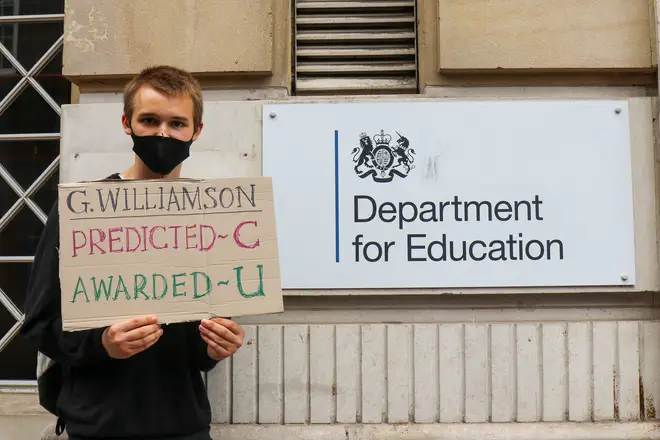
Clive Bull 1am - 4am
15 August 2020, 18:21

Students in England will be able to submit course work in support of appeals against their A-level grades, the exams regulator has said.
Ofqual published eight criteria for using mocks in the “triple lock” system amid growing calls for clarity from school leaders ahead of GCSE results day next week.
Ministers are facing a furious backlash after 280,000 recommended A-level grades submitted by teachers - 39.1 per cent of the total - were downgraded under Ofqual's standardisation process.
The Government announced 36 hours before results day that A-level and GCSE students would be able to use results in “valid” mock exams to appeal if they were unhappy with their results.
Alternatively, schools can submit appeals or sit exams in the autumn.
The addition of coursework means recordings of performances by drama students, art work by arts students and practical projects by technology students could form part of any appeal.
Read more: A-level student tells schools minister 'you've ruined my life'

Ofqual said it would allow non-exam assessment marks to be used to “make sure this opportunity is available to a wide range of students, including those who had not taken a written mock exam before schools and colleges closed”.
"We will therefore allow a non-exam assessment mark to be used too. Successful appeals on this ground will allow the student to receive the mock grade," the watchdog added.
It also confirmed no grades would be lowered as a result of an appeal.
The eight criteria for mock-based appeals are:
1. Conditions: "Supervised, unseen" assessment under exam board conditions, including "appropriate invigilation", no access to unauthorised materials, and "no possibility of corrections or revisions"
2. Form of assessment: Either past papers from the exam board or assessments created by teachers "to align to exam past assessments". Marked non-exam assessments can be used "instead or in addition" to mock exams
3. Syllabus: "Substantial coverage" of the specification for the given subject
4. Duration: Taken under the timed conditions required by the given assessment, with adjustments for those with special measures
5. Time period: The mocks or other assessment must have been taken by 20 March 2020, when schools and colleges shut
6. Marking: Using an exam board-approved mark scheme, "or aligned with the exam board's mark scheme" and marked no later than when teachers submitted their predictions - (centre-assessed grades (CAG) - to exam boards
7. Final grade: The result awarded must be "in line with the exam board's examination standard"
8. Evidence: Schools appealing with mocks must produce evidence of the mark given and that marking was carried out by the date of teachers' prediction submission, and must send the paper and mark scheme - but not students' exam scripts.
Teachers were asked to submit grades based on prior attainment and rank pupils after all exams were cancelled due to coronavirus.
But Ofqual's controversial algorithm, designed to align result with the schools’ average from previous years, led to many top-performing pupils, poorer pupils and state schools losing out.
Many students were turned down by their university choices.

Listener shares insights into A-level algorithm failures
Education Secretary Gavin Williamson promised to cover the cost of appeals on Friday night, after growing fury that exam boards were charging schools up to £150 per appeal.
Centres will need to complete and send to the exam board a simple form to confirm each of the criteria has been met, provide the mock exam grade and a signed declaration from the head of centre, Ofqual said.
But Ofqual’s announcement says that “in circumstances where the [CAG] was lower than the mock grade, the student will receive the [CAG].”
Officials confirmed appeals using mock results could begin from Monday and would apply for GCSE, AS and A-level students as well as those taking Extended Project Qualifications and Advanced Extension Award in maths.

A-level fiasco that's destroyed daughter's university chances
Geoff Barton, general secretary of the Association of School and College Leaders, said: “This is clearly a face-saving exercise by a Government which has said that it won't do a U-turn on its pledge that moderated grades will stand, come what may.
“Instead, it is attempting to remedy the grading fiasco through an appeals process so surreal and bureaucratic that it would be better off at this point doing that U-turn and allowing original teacher-assessed grades, where they are higher, to replace moderated grades.
“That would be a better approach than this appeals system as it would mean students would get revised A-level grades immediately on the basis of the teacher assessments already conducted, which draw on the very evidence that is now proposed as part of the appeals process.”
He added: “We don't blame Ofqual for the bizarre nature of the appeals criteria. The regulator has been given a hospital pass by a Government that is in disarray. It is time for ministers to stop the chaos and fall back on teacher-assessed grades rather than prolong this nightmare.”
LBC News has approached the Department for Education for comment.